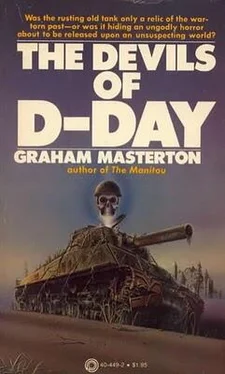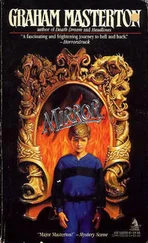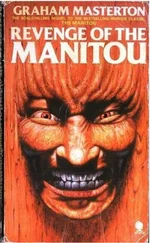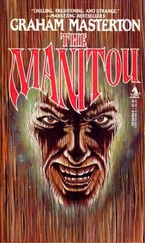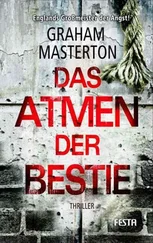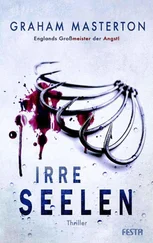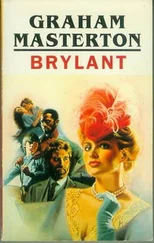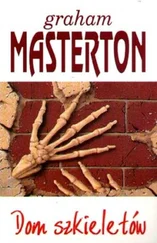Father Anton smiled. “No, monsieur. I have my wits and my training to protect me, and above all I have my God.”
“You don’t think that it—well, might attack us?”
The old priest shrugged. “You can never tell with devils. I don’t yet know which devil this is, although we’ve guessed it might be one of the thirteen demons of Rouen. It might be powerful, it might be weak. It might be treacherous or wrathful. Until we have done the seven tests on it, we shall not be able to find out.”
“The seven tests?”
“Seven ancient tests which identify whether a devil of hell or of earth; whether it spreads its evil by pestilence or by fire; whether it is high in the ranks of the evil Sephiroth, or whether it is nothing more than a servile thing that creeps upon the face of the earth.”
I rose from my chair and walked across the room. Outside, the snow tumbled and twisted through the night, and the front of Father Anton’s house was like a pale execution yard, untrod, unmarked with blood.
“Are you frightened?” Father Anton said, in a husky voice.
I paused for a moment to think. Then I said: “Yes, I think so.”
“Then kneel here, monsieur, if you will; and I shall say a prayer for you.”
I turned round. He was sitting by the dying fire with a look of real concern on his face. I said gently: “No thank you, father. Tonight I think I’ll trust to luck.”
I was to sleep in a high green-painted iron bed in a small room on the uppermost floor. Father Anton lent me a voluminous white nightshirt, white bed-socks, and a copy of L’lnvocation des Anges , leather-bound and smelling of dust, to read by the light of my shaky bedside lamp.
We said goodnight on the second floor, where Father Anton himself slept, and then I creaked up through the gloomy house to the long narrow corridor where my own room was. Antoinette had left the light on upstairs, despite Father Anton’s usual frugality, and I was grateful for it. I beetled along that corridor as if the ten evil Sephiroth were panting down my neck, closed my door and locked it.
The room was plain, but it wasn’t bad. Apart from the bed, there was a cheap pine dresser with a mirror, and one of those vast French wardrobes in which to hang my crumpled coat and shirt. There was a washbasin in one corner, and a circular window with a view over the snowy rooftops of Pont D’Ouilly. I washed with hard kitchen soap, rinsed my mouth out with water, and then pulled on Father Anton’s nightshirt. I looked like Stan Laurel in one of those movies where Laurel and Hardy have to spend the night in a haunted house.
The springs complained noisily when I climbed into bed. I sat upright for a while, listening to the sounds of the house and the night outside; and then I opened the book that Father Anton had lent me, and started to read.
My French was so halting that it took me half an hour to read the first page, and that was a lengthy apology from the author, Henri St. Ermin, for his platitudinous style and his lack of talent with a pen. I couldn’t have agreed with him more. I skipped the text and looked at the engravings instead.
I began to understand what Father Anton had meant when he said that angels were terrible. There were drawings of angels that were nothing but intense sources of light with spreading wings. There were angels like fierce, proud beasts. And there were angels who were unseen, but who came at night like violent storms, and laid waste to the houses of the wicked. It was plain from the captions under each of the pictures that you had to invoke the right angel for the right temporal task, otherwise you might find yourself, metaphorically speaking, plugging a flashlight bulb into a nuclear power station. One caption warned of “the angel which comes in a cloak of clouds, in which are the faces of those who have sinned and repented their sins”.
Outside in the snow, the church clock struck two, and I closed my less-than-reassuring midnight reader, switched off my light, and settled down to get some sleep. In the dark, the house seemed even noisier than it had with the lights on. Something scurried and flurried up in the attic above me, and the joists and timbers creaked and groaned and complained to each other like arthritic old women in a doctor’s waiting-room.
I slept for maybe ten minutes; and woke to hear my watch ticking on the bedside table. The house was quieter now, and I fell asleep again, although this time I began to dream. I dreamed I was opening doors in a gloomy building, and behind each door there was something fearful. I could hardly bear to place my hand on the doorknobs and turn them, but I had a terrible compulsion to find out what was there. Through the tenth or the eleventh door, there was a narrow corridor, and at the end of the corridor someone was standing. Someone small, like a child, with its back to me. I began to work my way slowly and glutinously down the corridor to see who it was, and all the time I knew that it was someone frightening, but all the time I was compelled to find out, compelled to go on.
As I came close, the small figure turned towards me, and for one moment I saw a face that grinned like a goat, with hideous yellow eyes. I was so scared that I woke up, and I was sitting upright in bed with my nightshirt tangled around my legs, sweating and chilled, and this time the church clock was just pealing three.
I switched on my bedside light and swung out of bed. I listened, but the house seemed reasonably quiet. Maybe the day’s events were just making me edgy. I tiptoed across to the door, and pressed my ear against the wood panelling; but all I could hear was the faint sad moan of the draught that perpetually blew around the house, rattling window sashes and setting chandeliers tinkling, and the usual creaks of floorboards and hinges.
The house was like an old ship at sea, rolling and heaving through a black silent ocean where no fish swam.
A voice whispered: “ Monsieur. ”
I stood slowly away from the door, my mouth salt with shock. I was sure that the voice had come from outside—right outside. It was a dry, sexless voice, the voice of an old woman, or a strange eunuch. I backed off, reaching behind me for the reassurance of my bed, when the voice again said, “ Monsieur. ”
I called hoarsely, “Who’s there? Is that you, father?”
“ Of course, ” answered the voice. “ Who else? ”
“What do you want? It’s late.”
“ This is my house. I shall walk where I please. ”
I bit my lip uncertainly. “Listen,” I said, “I don’t think that you are Father Anton.”
“ Who else could I be? ”
“I don’t know. Beelzebub?”
The voice cackled. “ Perhaps you ought to open the door and find out. ”
I waited, with my heart taking great irregular gallops under my ribs, and my pulse banging away in sympathy. I heard a shuffling noise outside and then the voice said, “ Monsieur? ”
“What is it?”
“ Open up, monsieur. I have something to show you. ”
“I don’t really want to, thanks. Listen, I’m in bed. I’ll talk in the morning.”
“ Are you afraid, monsieur? ”
I didn’t answer that one. Whatever or whoever it was outside, I didn’t want them to know just how frightened I was. I looked around the room for some kind of a weapon, and in the end I picked up a cheap alloy candlestick from the washstand. It wasn’t very heavy, but it made me feel better.
The voice said, “ The girl is beautiful, isn’t she? ”
“Which girl?”
“ Madeleine. ”
“Can’t we talk about it tomorrow? I’m tired. And anyway, I’d like to know who you are.”
Читать дальше
